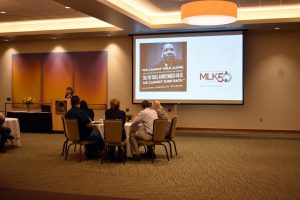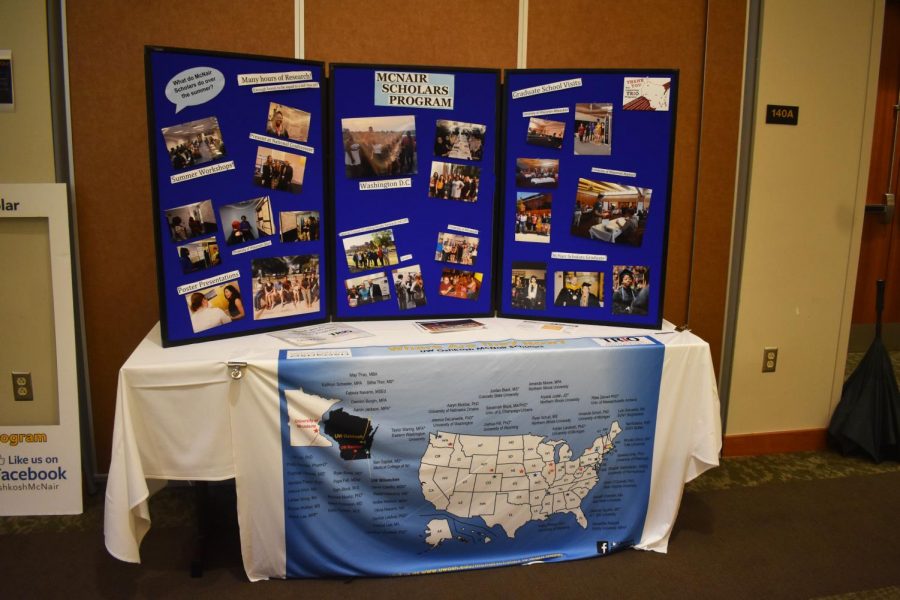Scholars present research from internship program
A poster on the McNair Scholars program is presented at the McNair Showcase.
September 27, 2018
UW Oshkosh’s McNair Scholars presented their research at the McNair Showcase on Tuesday at the Alumni Welcome and Conference Center.
The event featured posters and displays of student research from their eight-week internships, followed by dinner and student presentations.
During the welcome ceremony, the UWO McNair Scholars Program Director, Cordelia Bowlus, said the projects showcased research from a variety of fields, including Science, Technology, Engineering and Math, social science and the humanities.
Bowlus said that the program honors Ronald E. McNair, a physicist and astronaut who died when the Challenger spacecraft exploded in 1986, by giving traditionally disadvantaged students the tools they need to succeed in graduate school.
McNair Scholars took turns presenting their research. Khaila Miles-Semons focused on the struggles African-American women faced during slavery, Bailey Young focused on the differentiation of dolphin skulls and Amanda Vue concentrated on domestic violence within the Hmong community.
Vue said she chose her topic because it is a very taboo subject rarely talked about within the community.
“I wanted to do more research about that because I know there isn’t a lot of research done on the Hmong community in general; this was my way of giving back to my community,” Vue said. “I wanted to start a conversation about this issue because I wanted to make it less stigmatized.”
Vue said her biggest obstacle was data collection and interviewing more females than males.
“If I could do this all over again, I would have had a male interviewer to encourage male participants,” Vue said. “It was kind of one-sided; it would have been nice to have an equal amount of responses from each gender.”

Monica Fieck, a McNair student who researched language development in children, said her biggest obstacle during the research process was time constraints.
“This internship is eight weeks long, so it doesn’t leave a lot of room for making mistakes and having to go back and fix things,” Fieck said. “My biggest obstacle was trying to get everything done on time because we had such a short window for all the things we were trying to accomplish.”
Andrew Miller, a McNair Scholar who researched plant genetics, said the time constraints taught him that he could handle high-stress situations.
“Doing research taught me how frustrating it could be, but that showed me that I can overcome it,” Miller said. “I didn’t think I would be able to get through all the obstacles and handle all the stress involved in the research itself.”
Dr. Morgan Churchill, Young’s faculty mentor, said teaching her how to take 3D scans of whale skulls was a rewarding experience.
“A year ago, she didn’t know anything about the subject matter, and a year later she’s presenting it and explaining it to everybody,” Churchill said. “It’s a satisfying feeling seeing students come that far.”
Fieck said through McNair, she realized that she wanted to pursue a career in social work after graduate school.
Fieck said, “The program helped me figure out what I want to do with my future, which is the whole point, to get us to go farther.”
Fieck said that if students qualify for McNair, they should join because of all the resources it provides to first-generation, low-income students.
“We had a whole graduate school boot camp,” Fieck said. “We visit graduate schools, and it pays for all that. It gives us research experience that we need anyway, but we’re getting paid to do it.”














